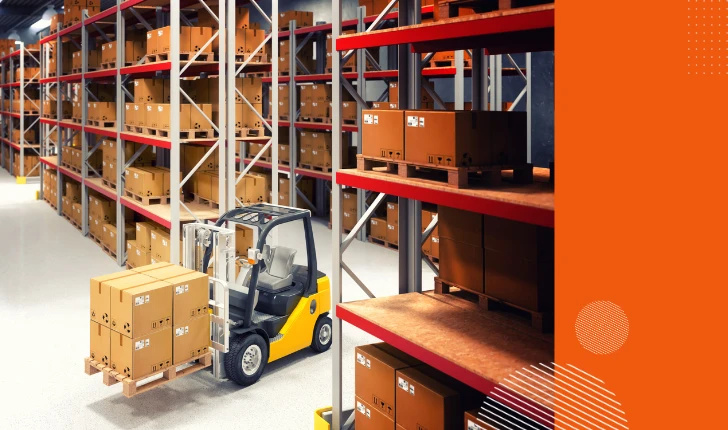Understanding ERP eCommerce: Software Comparison and Benefits
ERP in ecommerce refers to the integration of an Enterprise Resource Planning (ERP) system with an ecommerce platform. It enables organizations to manage various business functions and processes and enhance decision-making by providing real-time visibility and control over their resources. This is a wholesome ecosystem that allows businesses to showcase their products, customers to browse and make purchases, and conduct transactions electronically.
Knowing the ERP in ecommerce is crucial for modern businesses as it is not only the way to streamline your operations and get rid of routine but also is a tool that allows real-time to have visibility into inventory levels, order status, and customer data, enhance customer experience, constantly grow and work efficiently. In this article, we see into the meaning of ERP for ecommerce businesses, the difference between ecommerce and ERP, and provide some examples of the best ERP systems for ecommerce.
Are ERP and eCommerce the Same Thing?
While serving the same purpose of helping businesses to automate routine and grow, ERP and ecommerce are different concepts. ERP integrates internal business processes and functions, while ecommerce is focused on online selling. Below, we provide key differences between the solutions to realize it deeper:
- Functionality and Scope
ERP is a centralized database aimed at streamlining operations by automating and coordinating everything, while ecommerce is a digital platform where businesses control, promote, and showcase their products, and customers browse and purchase them.
- Purpose
ERP is aimed at streamlining and integrating internal business processes and improving decision-making, while the main idea of ecommerce is to enable businesses to reach a wider audience by selling products or services through a digital platform.
- Scope of Impact
ERPs impact the entire organization as they integrate multiple functions and departments with cross-functional collaboration. eCommerce platforms primarily impact the sales and marketing aspects of a business.
- Data Integration
ERP systems centralize and integrate data from various departments, enabling seamless information flow across the organization. eCommerce systems may require integration with other systems, such as ERP, to ensure efficient order processing and inventory synchronization.
- Client focus and self-service
ERP systems are usually internally focused closed systems as they provide tools for managing resources, optimizing processes, and enhancing productivity. eCommerce platforms, in turn, are customer-facing and may offer capabilities of retrieving data from ERP and sharing them with customers in a transparent way through self-service features.
The difference between ERP and ecommerce
How Can ERP Support eCommerce?
Using these systems together is a great strategy. Businesses that integrate their ERP and ecommerce systems can notice faster operations and higher quality of all processes. We have collected several examples of how companies use integrated systems:
- Seamless order processing.
The integration of the two systems makes the whole ordering process easier. When a customer places an order through an ecommerce platform, it is automatically transferred to the ERP system. The ERP system then processes the order, updates inventory levels, generates invoices, and initiates the fulfillment process.
- Real-time inventory.
ERP and ecommerce integration used together allow for real-time inventory management. This guarantees the display of accurate stock availability on the ecommerce shopping website and ERP data synced with the system, preventing overselling, backorders, and discrepancies between online stock and actual inventory levels.
- Pricing and product catalog management
Pricing rules and discounts configured in the ERP system can be synchronized with the ecommerce platform. All the pricing and product catalog details can be automatically reflected on the ecommerce platform.
- Customer data and personalization
Integrating ERP with ecommerce allows businesses to consolidate customer data and use it for personalization purposes. Businesses can now offer product recommendations, targeted promotions, and tailored shopping experiences based on individual customer profiles.
- Financial integration
eCommerce integration with ERP streamlines financial processes: the ERP system automatically generates invoices, updates financial records, and initiates payment processing after they appear in ecommerce.
- Reporting and analytics
Data from both systems provide insights into sales performance and enable businesses to create and track reports and analytics on basically all processes.
Examples of ERP and ecommerce use
Retail companies
Retail businesses integrate their ecommerce platform with an ERP system to automate order processing and inventory management. The ERP system ecommerce updates inventory levels in real-time, ensuring accurate stock information on the ecommerce platform. This streamlines the order fulfillment process and reduces the chances of overselling or stockouts.
Manufacturers
A manufacturer uses integrated ERP and ecommerce to improve data accu
racy and visibility. The ERP system synchronizes product catalogs, pricing, and inventory levels with the ecommerce platform. Such an approach helps businesses to have consistent product information, pricing, and availability across all sales channels.
Online Marketplaces
Marketplaces use integrations to streamline business processes. The ERP system automates order processing, inventory management, and financials for marketplace sellers. Such integrations aim at increased seller satisfaction and a better customer experience.
ERP Features for eCommerce
Most companies start with having an ecommerce platform. Later, they complement it with CRMs, ERPs, and other systems automating internal processes. So, what features in ERP are so valuable for ecommerce platforms? We have selected the most important ones that affect work seriously and improve the working flow.
- Inventory management feature.
With robust inventory management capabilities, ERP systems allow businesses to track stock levels, monitor inventory movements, and manage product data. It helps prevent overselling, enables real-time visibility of stock availability to customers, and facilitates efficient order fulfillment. An ecommerce business can use ERP inventory management features to track stock levels, update product availability in real time, and avoid stockouts or overselling.
- Order Processing
Modern software helps to work with customers and manage payment transactions. This way, ERP systems help automate the order fulfillment process and improve customer satisfaction.
- Shipping and Fulfillment
The ERPs also cover the logistics aspect. Businesses can manage all shipping and fulfillment capabilities in a smooth and timely manner.
- CRM functionality
ERP systems often include CRM functionality to track customer information, analyze customer behavior, and personalize the customer experience. In the context of ecommerce, CRM capabilities within ERP systems enable businesses to provide personalized recommendations, targeted marketing campaigns, and responsive customer support.
ERP CRM features allow businesses to capture and manage customer data, personalize the shopping experience, and provide responsive customer support, enhancing customer satisfaction and loyalty.
- Analytics and Reporting
ERP systems provide robust analytics and reporting capabilities. This helps businesses make data-driven decisions, identify trends and assess ecommerce operations' overall performance.
How Do I Prepare for eCommerce ERP Integration?
Preparing for ERP integration with ecommerce is crucial to ensure smooth and successful implementation. To prepare for integration, businesses should:
- Define objectives. Clearly define the goals and objectives of the integration project, such as improving operational efficiency, streamlining processes, or enhancing customer experience.
- Assess business processes. Evaluate existing ecommerce and ERP systems, identify gaps, and determine how integration can address those gaps and streamline workflows.
- Data mapping and clean-up. Map data fields between systems and ensure data consistency, accuracy, and compatibility. Cleanse and standardize data to avoid issues during integration.
- Plan for integration. Develop a comprehensive integration plan, including timelines, resources required, and potential challenges. Identify integration points, APIs, or middleware needed for data exchange.
- Testing and training. Conduct thorough testing to ensure data integrity and system functionality. Train teams and users on the new processes.
Preparing for ecommerce ERP system integration is important as it will help you to make the integration process smooth both for internal and external users and get the expected result with no surprises.
eCommerce ERP Software
B2B ecommerce ERP software means solutions offering an integrated ecommerce platform and an ERP system. They embrace the front-end operations of an online store with the back-end functions of an ERP system. ERP software for ecommerce provides a centralized platform for managing and automating various business processes involved in running an ecommerce operation.
Benefits of using ecommerce ERP software
- Streamlined operations. ecommerce ERP software integrates and automates key business processes, eliminating manual work and improving efficiency.
- Enhanced data accuracy. Integration between ecommerce and ERP ensures consistent and accurate data across systems, minimizing errors and discrepancies.
- Improved inventory management. Real-time inventory tracking and management capabilities enable businesses to optimize stock levels and avoid stockouts or overstocks.
- Seamless order processing. Integration streamlines the order processing cycle, from order placement to fulfillment, ensuring faster and more accurate order handling.
- Enhanced customer experience. ecommerce ERP software enables personalized experiences, efficient customer support, and seamless transactions, leading to higher customer satisfaction.
- Better decision-making. The consolidated data from ecommerce and ERP systems provides insights for informed decision-making, strategic planning, and business growth.
Comparison of the most popular ERP software features
|
Features
|
SAP ERP eCommerce
|
Oracle NetSuite
|
Microsoft Dynamics 365
|
Magento ERP
|
Epicor
|
|---|---|---|---|---|---|
Inventory Management |
High | High | High | Medium | High |
| Order Processing | High | High | High | High | High |
| Shipping and Fulfillment | High | High | High | Medium | High |
| Customer Relationship Management | High | High | High | Medium | High |
| Analytics and Reporting | High | High | High | Medium | High |
| eCommerce Platform Integration | + | + | + | + | + |
| Pricing | Custom Quote, high, requires additional payments for innovation | Subscription-Based | Subscription-Based | Custom Quote | Custom Quote |
| Deployment Options | On-premise and Cloud | Cloud | On-premise and Cloud | On-premise and Cloud | On-premise and Cloud |
| Customer Support | + | + | + | + | + |
| Cloud ERP (ecommerce) | + | + | + | + | + |
| Business Size | Small, Mid, Enterprise | Small, Mid, Enterprise | Small, Mid, Enterprise | Small, Mid, Enterprise | Mid, Enterprise |
Choosing the Best ERP for eCommerce Companies
When choosing an ERP (Enterprise Resource Planning) system for ecommerce, it's crucial to consider several factors to ensure that you select the best solution for your business. Here are some key considerations:
- Find out your business requirements.
Begin by identifying your specific ecommerce requirements. Consider aspects such as inventory management, order processing, shipping and logistics, customer relationship management (CRM), financial management, reporting and analytics, and integration capabilities. Make a list of the functionalities and features you need from an ERP system to support your ecommerce operations effectively.
- Evaluate the scalability and flexibility of the future solution
Evaluate the scalability and flexibility of the ERP system. Determine if it can accommodate your business's growth and handle increasing order volumes, inventory levels, and customer demands. The system should be flexible enough to adapt to your changing business needs and support future expansion.
- Integration capabilities
Assess the ERP system's integration capabilities with other essential tools and systems you use, such as your ecommerce platform, payment gateways, shipping carriers, CRM software, and marketing automation tools. Seamless integration reduces manual data entry and enhances efficiency by automating processes and ensuring accurate data flow across systems.
- Customization and configuration
Determine the level of customization and configuration the ERP system offers. Each business has unique processes and requirements, so the system should allow you to tailor it to match your specific workflows. Look for an ecommerce ERP solution that provides customization options without excessive complexity or requiring extensive coding knowledge.
- Support and vendor reliability
Consider vendor experience, support services, and the availability and frequency of updates and maintenance.
- Cost considerations
Evaluate the overall cost of implementation. Request an RFQ from the future vendor so they can tell you if any additional payments will ever be required. Assess the return on investment (ROI) potential of the system and determine if it aligns with your budget and long-term business goals.
- Security and data protection
Ensure that the ERP system prioritizes data security and provides robust measures to protect sensitive customer information, financial data, and other critical business data. Look for features such as encryption, secure data storage, user access controls, and compliance with relevant data protection regulations.
- Capability for innovation and further growth
Ensure that the solution chosen can easily integrate with other software and offers capabilities for innovation. Most of the modern solutions offer modular systems ready to upgrade one by one when necessary. However, many popular but outdated solutions keep companies from growing because any change is expensive and takes a lot of time.
How Virto Integrates with ERP
Virto Commerce is an API-based system tailored to be integrated with third-party solutions, particularly ERP. We use integration middleware instead of point-to-point integrations to make the process smooth and seamless. Let’s see how it works:
- First, we synchronize catalogs, prices, balances, and customer-related data. The Integration Middleware connects to the ERP, reads the data, and passes it through the API to Virto Commerce.
- Then we enrich the data to ensure product specs, pictures, descriptions, and SEO are connected to catalog items.
- Next, we transfer data back to the ERP, and an entry in the ERP appears.
- Finally, the client places an order, and it also goes straight to the ERP through the integration middleware.
As a result, data is synchronized in real-time, and the customer can easily use both systems separately while using the same data. Here are the benefits you get with Virto + ERP integrations:
- Improved inventory management, warehouse, and logistics tasks.
- Enhanced and transparent order processing, approval, and fulfillment.
- Easy exchange of financial data and reporting, routine optimization.
- Better offerings management and improved customer experience.
- All in all, increased efficiency and more accurate decision-making.
Almost all Virto clients request ERP integrations, good examples are Proffsmagasinet, De Klok Dranken, and more. We have described the process in detail in our ERP and eCommerce Integration Guide.
Integration of ERP and ecommerce with the middleware
Conclusion
Though ERP and ecommerce are different, working together, they can bring business to a new level. Before starting an integration, assess your real business requirements, and ensure that the solution is customizable and the vendor offers good support and reliable data protection.
For those ready to integrate their ERP solutions with modern modular ecommerce platforms, the Virto Commerce team offers free demos that will help you realize the real strength of the embedded functionality of ERP and ecommerce. Reach out now to learn more.
Book Your Discovery Session with Our Digital Experts
FAQ about ERP eCommerce










